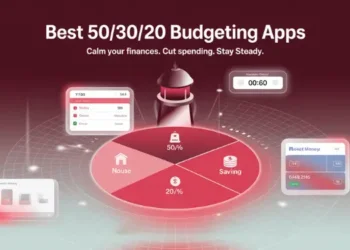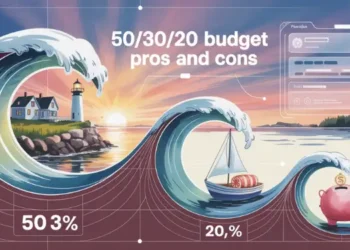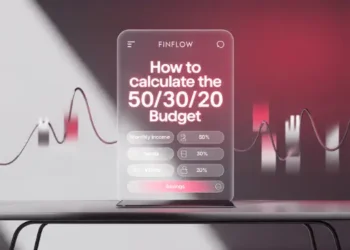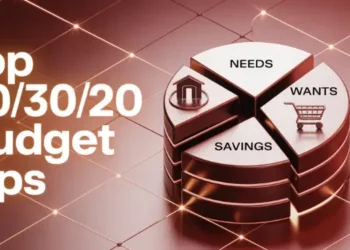Do you think making a budget takes hours? A recent survey shows 80% of Americans spend less than an hour a month on budgeting. Rachel Cruze, a personal finance expert, says, “A budget should help, not stress you out.”
I used to find it hard to finish my budget every month. But then I found the “10-Minute Method.” It makes budgeting easy and stress-free. Here’s how to do it:
• Spend 2 minutes each morning to check your budget
• Use 3 midday minutes to log what you’ve spent so far
• Save 5 evening minutes to adjust and plan for tomorrow
Gather Final Receipts and Clear Pending Transactions Before the Reset
As the end of the month comes, it’s key to wrap up your budget. This habit keeps you on budget and fresh for the next month. Start by collecting any receipts from the last few weeks. These might be from food, gas, or surprise costs.
Then, check your accounts for any transactions waiting to be cleared. This includes checks that haven’t been cashed or automatic payments that haven’t gone through. Write these down in your budget sheet or app for a clear view of your spending.
Using a zero-based budget is a smart way to budget. It means every dollar has a job, like for bills, savings, or debt. Your aim is to have income minus expenses equal zero, showing you’re using every penny wisely.
By collecting receipts and noting pending transactions before month-end, you get a real look at your finances. This lets you make smart choices and stay on track with your budget. It’s quick work but leads to better budgeting habits.
Reconcile Account Balances Against Budget Totals in One Focused Session
When the month ends, it’s time to check your money against your budget. This helps you see where your money went and if you spent too much. It’s a chance to make sure every dollar is used wisely.
Start by looking at your bank and credit card statements. Compare them to your budget. Check each expense to see if it matches. Look for any big differences, as they can add up fast.
Here’s a simple table to help you reconcile your account balances:
| Budget Category | Budgeted Amount | Actual Spending | Difference |
|---|---|---|---|
| Groceries | $400 | $425 | -$25 |
| Dining Out | $150 | $200 | -$50 |
| Gas & Transportation | $200 | $180 | $20 |
| Entertainment | $100 | $120 | -$20 |
Spot Discrepancies Over Five Dollars and Correct Them Quickly
If you’ve spent more than planned, don’t worry. Just fix it fast. Update your budget to show what you really spent. Think about how to spend less next month.
It’s important to track every dollar. This way, you know where your money goes. You can see if you’re spending too much and plan better for next month.
Tracking every expense keeps you accountable, avoids overspending, and helps identify areas to adjust going forward.
By spending time on this, you’ll manage your money better. You’ll make smarter choices about spending. Keep up with this habit to reach your financial goals.
Sweep Leftover Dollars Toward Your Top Savings or Debt Goal
After you’ve checked your budget, look at any money you have left. Even a little extra cash can help a lot over time. Make sure to use this money available for your most important goals.
First, work on saving for an emergency fund. Aim for 3-6 months of living costs. This safety net helps when unexpected things happen, like losing your job or getting sick. After you have enough saved, use it for other savings goals or to pay off debt:
- Save for a down payment on a house or car
- Boost retirement contributions
- Pay off high-interest credit card debt
- Fund a vacation or hobby
“Do not save what is left after spending; instead spend what is left after saving.”
– Warren Buffett
To keep yourself going, watch how your extra money helps you each month:
| Month | Extra Cash | Emergency Fund | Credit Card Debt |
|---|---|---|---|
| January | $250 | $750 | $5,400 |
| February | $175 | $925 | $5,225 |
| March | $200 | $1,125 | $5,025 |
By saving a little each month, you’ll make great progress toward your big dreams. Give every spare dollar a job. Celebrate each success as you reach your goals.
“read more: Zero budgeting vs pay first which approach fits“
Record Lessons Learned in a Brief Monthly Budget Journal
As you finish your monthly income and expenses, think about what you learned. Write down quick notes in a budget journal. This helps you get better at managing money and prepares you for the new month.
Think about what went right and what was hard. Were there any surprises? Did you find any spending triggers or successes? Write these down while they’re fresh. Be clear about where you can try to cut costs or change your budget for the next month.
Watch for expenses that might change over time, like:
- Seasonal utilities
- Subscriptions coming due
- Upcoming events or travel
Your budget journal doesn’t have to be long or hard. Just focus on the main lessons and takeaways. By thinking about your progress and challenges, you’ll understand your spending better. This helps you make smarter choices in the future.
Remember, getting better at budgeting takes time and practice. Use each month to learn and grow. Celebrate your small wins. With hard work and a careful approach, you’ll reach your financial goals.
Draft Next Month’s Plan Using Fresh Information Within Twenty Minutes
At the beginning of the month, take a few minutes to review your budget. Look at your income from last month and any changes to your fixed expenses or monthly bills.
Then, think about your grocery budget. Did you save for any irregular expenses? Adjust your budget as needed, but make small changes each month.
Read also: Zero budgeting vs traditional budgeting choosing the right method“
Copy Categories Then Adjust Amounts Without Rebuilding From Scratch
To make budgeting easier, start with a template. It should have your usual spending categories. Here’s an example:
| Category | Last Month | This Month |
|---|---|---|
| Income | $4,500 | $4,600 |
| Rent/Mortgage | $1,200 | $1,200 |
| Utilities | $250 | $260 |
| Groceries | $400 | $380 |
| Transportation | $150 | $150 |
| Savings | $300 | $350 |
By copying your categories each month, you can adjust the amounts. This saves time and keeps your budget consistent. You won’t have to start over every month.
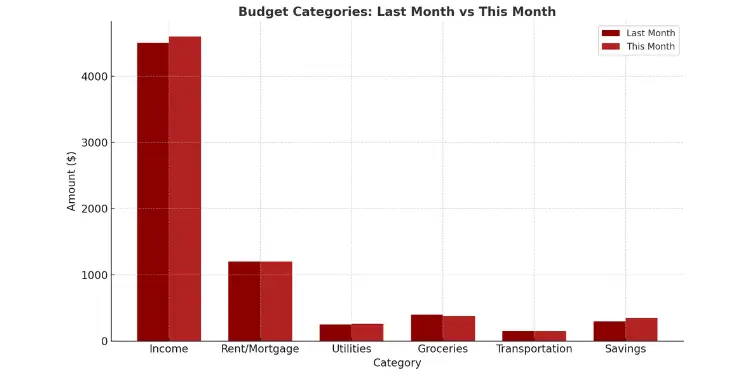
Read More:
Activate Bill Payments and Transfers to Lock Your Plan in Place
After you’ve set your budget for the month, it’s time to start. Check all your automatic payments and transfers. Make sure the amounts and dates are right to avoid surprises.
With a few clicks, you can make sure your bills are paid on time. Next, set up regular money moves to your savings and investments. This helps you build wealth over time.
Make a list of things you need to pay for sometimes, like insurance or car registration. Automate these payments too. This way, you won’t be tempted to spend that money elsewhere.
Use any extra money for things you want and for your goals. This could be saving for a trip, paying off debt, or investing for retirement. Automatic transfers help you stay on track. Now, you’re ready to follow your budget every day and watch your money grow.



